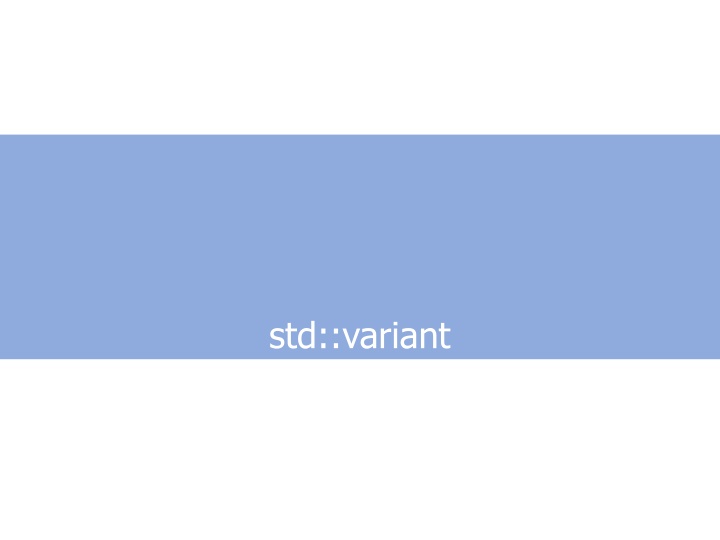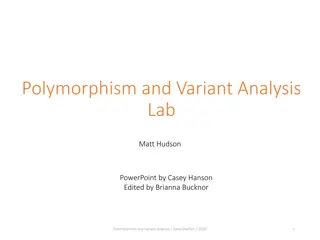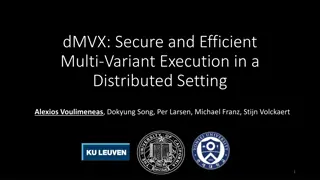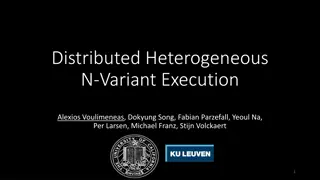
Understanding std
variant and its Benefits"
Download Presentation

Please find below an Image/Link to download the presentation.
The content on the website is provided AS IS for your information and personal use only. It may not be sold, licensed, or shared on other websites without obtaining consent from the author. If you encounter any issues during the download, it is possible that the publisher has removed the file from their server.
You are allowed to download the files provided on this website for personal or commercial use, subject to the condition that they are used lawfully. All files are the property of their respective owners.
The content on the website is provided AS IS for your information and personal use only. It may not be sold, licensed, or shared on other websites without obtaining consent from the author.
E N D
Presentation Transcript
std::variant std::variant - a polymorphic type containing one of a fixed set of types Safe replacement of C unions plus a data element to remember which type it is using VT = std::variant< T0, T1, T2>; More space-effective than a pointer to a dynamically-allocated object with inheritance If the types are of similar sizes But not extensible There is no common interface (base class) required in the types Allows assignment from any of the types T0 v0 = /*...*/; VT a = v0; VT b(std::in_place_type<T1>, /*...*/); VT c(std::in_place_index<2>, /*...*/); b = v0; // calls T1::~T1(), T0::T0(v0) c.emplace<T1>(/*...*/); // calls T2::~T2(), T1::T1(/*...*/) a.emplace<2>(/*...*/); // calls T0::~T0(), T2::T2(/*...*/) Access to the contained data: void action( VT & vo) { switch ( vo.index() ) { case 0: { T0 & v0 = std::get< 0>(vo); v0.f(); } break; case 1: { T1 & v1 = std::get< 1>(vo); v1.g(); } break; case 2: { T2 & v2 = std::get< 2>(vo); v2.h(); } break; } // calls T1::T1(/*...*/) // calls T2::T2(/*...*/) NPRG041 Programov n v C++ - 2019/2020 2 David
Storing polymorphic objects Using std::variant Using inheritance T1 T1 useful data useful data index T2 Base T3 type info std::unique_ptr<Base> x = std::make_unique<T1>(/*...*/); Higher run-time cost Pointer, dynamic allocation Extensible set of concrete types std::variant<T1,T2,T3> x = T1(/*...*/); Lower run-time cost No dynamic allocation Always requires maximum space Not intrusive Does not use any base class Fixed set of alternative types NPRG041 Programmin g in C++ - 2019/2020 3 David
std::variant and static visitor using VT = std::variant< T0, T1, T2>; std::visit - Usage through a polymorphic functor struct VisitorA { void operator()( T0 & x) { /*...*/ } void operator()( T1 & x) { /*...*/ } void operator()( T2 & x) { /*...*/ } }; void action( VT & vo) { VisitorA va; std::visit(va, vo); } It may be used with a polymorphic lambda std::visit([](auto && a){ a.something(); }, vo); All the types need a common interface The interface is not explicitly declared This is a static equivalent of inheritance and virtual functions At higher cost visit requires a tricky implementation similar to visitors But the memory footprint may still be smaller no dynamic allocation NPRG041 Programov n v C++ - 2019/2020 4 David






















